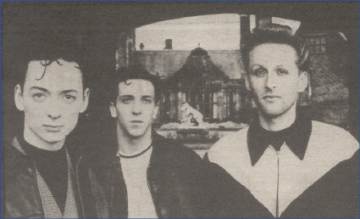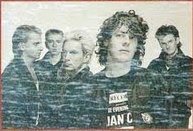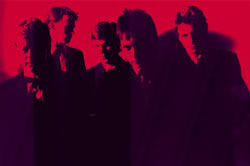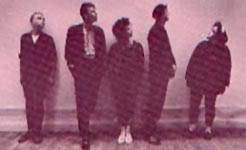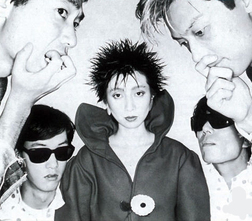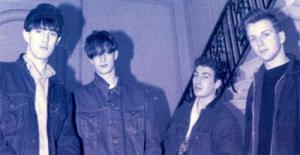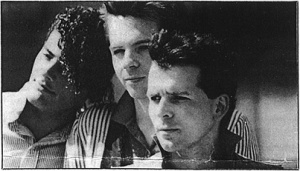Today we take a look at Liverpool cult legends The Wild Swans, the brainchild of lead member Paul Simpson. Anyone who was not only able to compete with Julian Cope for stage presence power, but also for creative control of The Teardrop Explodes during his time as a member, was surely destined to form a legendary band of his own. And while The Wild Swans may never have been as famous or as commercially successful as their peers Echo & the Bunnymen, The Teardrop Explodes and Wah! Heat, they were certainly every bit as musically innovative and as powerful. While his name may not be so familiar to many, Paul Simpson is an undisputed legend of Liverpool post-punk, and one of the most prolific and consistently brilliant songwriters the city has ever spawned. A veteran of the Liverpool punk scene, known to some as ‘Simmo’ in the early days, it was Paul Simpson who was indirectly responsible for giving The Teardrop Explodes their name, as the owner of the Daredevil comic from which they took their moniker. A founder member of the Teardrops as their original keyboardist, Paul was already heavily looked up to by the punks of Liverpool as someone who was safe to join a band with. His mother was a spiritual healer and had allegedly predicted that her son would be huge. So join a band with ‘Simmo’ and you couldn’t go wrong. This pretty much gave Julian Cope and his co-founders their initial confidence in the Teardrops; not to mention that Paul was allegedly the first member of the band to be asked for an autograph. His powerful stage presence and songwriting skills (Paul co-wrote the first two Teardrop Explodes singles) were a lead force in getting the Teardrops into the limelight, but as Julian took control of the band’s musical direction it soon became obvious there was only room for one genius in the band, and Paul left early on to start a band of his own. And thus The Wild Swans were born, in late 1980.
Simpson formed The Wild Swans with Jeremy ‘Jem’ Kelly (guitar) and Ged Quinn (keyboards), the latter whom had briefly replaced him in the Teardrops. Together, the three of them were to become the crucial core of The Wild Swans. In early rehearsals, Paul just let Jem and Ged get on with jamming the music while he looked on and sang nothing. It was only after several rehearsals that Paul finally stepped to the mic and proved he could sing. And the magic was pretty much there from the start, as the three members’ natural musical chemistry took no time in emerging. As Jem has stated, “There was an incredible atmosphere down there, and everything just gelled… There was this kind of immediate intuitive thing.”
As the band gigged around Liverpool, with drummer Justin Stavely and numerous different bassists (the band members claim no less than 28 different bassists played with them throughout their first incarnation), their peers quickly formed the same high impression of their distinctive sound, and eventually, Paul’s flatmate- the legendary Pete De Freitas, drummer with Echo & the Bunnymen- financed The Wild Swans’ first studio session, with the first royalty cheque from his work with the Bunnymen. When Stavely failed to turn up for the recording session, De Freitas himself wound up playing the drums on as well as producing the debut single, The Revolutionary Spirit, credited under his middle names ‘Louis Vincent’. Due to studio inexperience, the single ended up being perhaps the only 12″ in history with the A-side recorded in mono and the B-side, God Forbid, in stereo. But it worked- the original mono version of The Revolutionary Spirit is undoubtedly stronger than the subsequent US-released stereo remix, with a raw rush and intensity lost in the subsequent version. The 12″ received rave reviews, becoming single of the week in numerous music papers, and quickly gaining cult status by ending up as the last record ever released on Bill Drummond’s cult label Zoo Records (Drummond himself went on to proclaim it “the best single we put out on Zoo”).
As bassists and drummers flitted in and out of their line-up, the rave response to the single gained The Wild Swans a BBC Radio 1 John Peel session, followed by a Winter 1981 tour supporting Echo & the Bunnymen. Playing to sold-out venues with a 4-5000 capacity, the band achieved an honour rarely bestowed upon support acts- they were given encores, following the rapturous responses to their powerful live set. The Wild Swans, it seemed, were about to become huge. Paul’s mother’s alleged prediction looked set to be proven right… but it’s unlikely that even the greatest psychics would have predicted that The Revolutionary Spirit single would wind up being the band’s only release in its original run. For the band members just weren’t at all keen to play the game of the music industry. As Paul Simpson puts it, “We were very suspicious of bands like China Crisis and The Icicle Works whose crime in our eyes was that they actually sent off demo tapes and played gigs.” The band had no desire to see their material tarnished in the studio by industry compromises and over-production. Unattractive offers of record contracts from major labels Phonogram and Arista held no appeal for the band members, and with no manager to tame the band’s youthful stubbornness or mediate between them and the record company, things gradually slowed down in The Wild Swans camp. When tension began to mount between the band members regarding their lack of a record contract, the band soon fizzled out.
Paul Simpson blames the split of the original line-up on the members having been “too young, too stubborn and too stoned to see what we had.” While The Wild Swans’ story does not end here, it is this first incarnation of the band that most consider to have produced its finest material, most of which was lost to the public eye until the retrospective compilation Incandescent was released in 2003. While it’s undoubtedly a good thing that these splendid tracks never surfaced in a bland, commodified and over-produced form on Arista Records, an independently-released album with Pete De Freitas producing would have been a surefire post-punk classic. The brooding, dreamy and melodramatic sound of The Wild Swans Mark I- with Jem’s spine-tingling, menacing guitar sound contrasting in a sonic, almost trippy soundscape against Ged’s warm, ethereal synth sound and Paul’s deep, quintessentially English vocal style and romantic, bedsit-angst-ridden lyrics- may not have been the flavour of the mainstream charts at the time, but it was quintessential listening for any fan of post-punk and neo-psychedelia. Newcomers to The Wild Swans would be highly recommended to start with the Incandescent collection- it’s the closest thing to the album that never was, with masterpieces such as the amazing No Bleeding, and the haunting Opium, which brings to mind a dreamier, trippier Joy Division.
During the mid-80s, Jem and Ged attained top 10 success with their new band The Lotus Eaters, best known for The First Picture Of You. Anguished at the loss of his band, Paul went on to form the duo Care with future Lightning Seeds frontman Ian Broudie. In an interesting twist of events, both groups were signed by Arista, leading them all to regret the split even more. Care reached the UK top 50 with the excellent Flaming Sword, but split before their album could be released. After The Lotus Eaters had also split, interest in The Wild Swans was reignited by an EP release of the band’s first Peel Session, and Paul hooked up with Jem and Ged to reform the band. The Wild Swans Mark II began with a triumphant comeback on Radio 1’s Janice Long show with drummer Alan Wills and bassist Joe Fearon, debuting a set of new songs, among them Northern England and Now and Forever, solid tunes with socio-political lyrics detailing the suffering of Liverpool under the Thatcher government. The band signed a contract with Seymour Stein’s Sire label, but things took a turn for the worse when Ged decided to leave the band to concentrate on painting, and the chemistry between Paul and Jem was weakened as both lamented the loss of Ged’s unique keyboard style. With session players on keyboards and drums, The Wild Swans recorded their first studio album, Bringing Home The Ashes. By this time it was clear that the band’s songwriting style had changed significantly from their Mark I stage, both Paul and Jem having taken a more cynical, pop-oriented approach gained from their respective time in Care and The Lotus Eaters. With producer Paul Hardiman (known at the time as Lloyd Cole’s producer) pushing for a commercial sound, Bringing Home The Ashes is very different from the early Wild Swans material, with artistic integrity having been undermined by the necessity for commercial appeal. Paul Simpson was dissatisfied with the album at the time and remains scathing of it today, describing it as “a faint photocopy of an X-ray of the sound and spirit of the original band and in my mind a wasted opportunity.” That said, despite the album’s more contrived formula, Bringing Home The Ashes is still a fine album and is liked by many fans even today. The intensity and anguish of The Wild Swans Mark I is replaced by a brighter, poppier sound which may not be evocative of the true spirit of The Wild Swans, but nevertheless carries plenty of strong, instantly appealing and uplifting tunes, with lyrics evoking a sense of hope and longing amidst a turbulent political and cultural environment. It is a testament to Paul Simpson’s songwriting abilities that an album he today describes as ‘rubbish’ can still be regarded as a masterwork of its time by many of the band’s fans.
Although it gained the band a fanbase in the US, Germany, Japan and particularly The Philippines, the album was heavily ignored back at home and made little impact. The lack of success led Jem to leave the band, and Paul reconvened with his partner from Care, Ian Broudie, who signed on to record and produce a new album with Paul as the sole remaining original member. The resulting album, Space Flower, released in 1990, is described by Paul as not a true Wild Swans album, but “more of a solo album featuring a load of mates”, and could indeed perhaps more justifiably have been released as such. The line-up for this album was Paul (vocals, mellotron, effects), Broudie (guitars, keyboards), Joe Fearon (bass), and Icicle Works members Ian McNabb (additional guitars, vocals) and Chris Sharrock (drums). Space Flower is an eccentric album that alienated many fans of The Wild Swans Mark I at the time, but is still preferred to its predecessor by Paul Simpson, and to this author is definitely superior to Bringing Home The Ashes despite its further removal from the classic Wild Swans sound. An album of upbeat, jangly, summery Indie-pop tunes that blend in nicely with the ‘Madchester’ scene so popular at the time, Space Flower is a neat showcase of the poppier side of Paul Simpson’s songwriting at its best- radio-friendly, but in a unique way, interspersing a sense of C86-esque twee and childlike naivety with a touch of 60s psychedelia. To heal himself of the bitterness of the split of The Wild Swans’ original line-up Paul had “immersed myself in a world of childhood and wonder. My reading matter consisted solely of children’s books and, never one for doing things by halves I even decorated my studio walls with 1960’s comics and toys.” It is described by Paul as ‘bubblegum pop’- and it lives up to this tag quite literally, with the album’s obsession with sweet food, reflected not only in the cover but in titles like Chocolate Bubblegum, Vanilla Melange and Tangerine Temple. With a feel of early Pink Floyd on a tangerine-flavoured LSD trip, Space Flower is the perfect listen for a pleasant summer’s day, and ends majestically with the amazing, 11-minute hypnotic trip of the excellent closing track Sea of Tranquility. Maybe it’s not a true Wild Swans album, but it’s still strongly recommended.
Nevertheless, as Space Flower did not gain a UK release and was consigned solely to the band’s overseas markets, it did little for the band on a commercial level, and Paul abandoned The Wild Swans. Paul Simpson spent most of his time from the mid-90s to the mid-00s working on his own project, the mostly instrumental act Skyray, an exercise in ambient musical soundscapes. During this time, Jem returned to The Lotus Eaters for a reunion, while Ged became a successful painter. The Wild Swans Mark I were to be remembered as one of the greatest ‘lost bands’ of Liverpool’s post-punk scene, retaining their legendary status, and interest in them was reignited in the mid-00s with the release of the Incandescent compilation, making many of the original band’s finest moments readily available for the first time. Both The Wild Swans Mark II albums were later re-issued in 2007, packaged together as the 2-CD set Magnitude. It was that same year that Paul Simpson announced on his MySpace that he would be resurrecting The Wild Swans for a third coming- this time to once and for all put right his ‘unfinished business’ with his legendary band. Of The Wild Swans’ comeback, he has said:
“The Wild Swans failure to realize its potential the first time around has obsessed me for over 20 years. This time I’m going to see it through to the bitter end. I cannot rest or be happy until I’ve made the albums, done the tours, documented the trip and finished what I started.”
A full reunion of the classic core of the band was not possible due to Jeremy Kelly’s commitment to The Lotus Eaters, while Ged Quinn could not commit to the band full-time having attained great success as a painter. But Ged is officially an ‘honourary member’ of the band, while Paul has assembled a finely selected crew of musicians to form the rest of the new line-up- Ricky Rene Maymi of the Brian Jonestown Massacre on guitar, Mike Mooney of Spiritualized on lead guitar, and Steve Beswick on drums. The latter three joined Paul and Ged to record the first Wild Swans album in over 20 years, while Les Pattinson (Echo & the Bunnymen) and producer Richard Turvey also contributed and are part of the touring line-up, handling bass and keyboards respectively. With Paul having set out to evoke not the original sound, but the original spirit of the band with the new line-up, The Wild Swans Mark III began officially in 2009 with the release of the single English Electric Lightning and a set of triumphant comeback gigs in Liverpool, which met with rave reviews.
This year, in 2011, The Wild Swans have released the album The Coldest Winter For A Hundred Years, which Paul Simpson says has satisfied his decades-long yearning to make ‘the definitive Wild Swans masterpiece’. Released on the independent Occultation label, the new album has sacrificed no artistic integrity for commerciality’s sake, and is a superb album that definitely recaptures the spirit and intensity of The Wild Swans’ early 80s material. While it may be different in sound, The Coldest Winter For A Hundred Years succeeds in recapturing the dark, ethereal feel, along with the wistfulness of the early material, and the romantic anguish of the lyrics, which muse over the state of England in the present day, the decline in culture under the governments of the last 30 years and the need for revolution. Subjects being largely ignored by many of the younger bands currently being hyped by the media… and The Wild Swans’ new material possesses a power and artistic strength lacking in many newer bands in today’s big business-controlled music climate. The Wild Swans have toured the UK recently and their live shows are nothing short of excellent, the new line-up possessing a perfect chemistry cutting right to the heart of the true spirit of the band. The Wild Swans have waited 30 years for their heyday, so why not now. Anyone reading this is strongly recommended to check them out live. The Wild Swans are still remembered as one of the greatest lost bands of the post-punk era… except that they are no longer ‘lost’. Let’s keep our fingers crossed that the new album is but the first of more solid masterpieces from these legends. If Paul Simpson’s mother did indeed predict her son would be huge, then she may indeed have been right… he may not be as famous as some of his musical peers from the time, but he has had a more than impressive career as a singer-songwriter and musician, and is still going strong. Now that his 30-year ghost has been exorcised with the resurrection of The Wild Swans, it’s time for this unsung legend of music to be appreciated by a wider audience.
References:
The Wild Swans- Official Website
Renascent Records (contains Wild Swans microsite)
Interview with The Wild Swans
Interview with Paul Simpson
